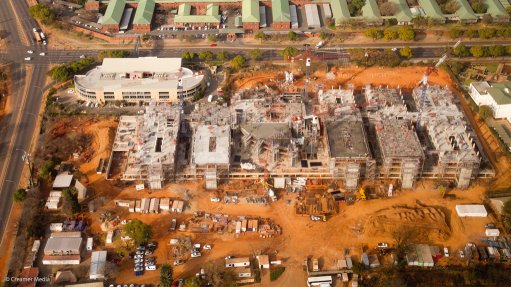
Photo by: Duane Daws
Civil engineering construction contractor Stefanutti Stocks Civils MD Werner Jerling has iterated the call for government to include input from consulting engineers and contractors “early on” in the tender conception process of large infrastructure projects to expedite the award process and provide “invaluable” project timeline and budget-related input.
“We’ve said this over and over and over again, but we’re talking to [the] walls,” he said in strident commentary at the Civilution Congress 2014, in Ekurhuleni, on Tuesday.
Jerling asserted that earlier involvement by construction and engineering professionals should occur during the development of the key resource plan, management strategy and project execution strategy, in conjunction with early-stage skills audits, labour engagement and training.
Project-employee relations should also be set and agreed upon in the early project phase, with greater input by contractors on the establishment of improved project controls and the identification of project-appropriate technology.
“We need a much better understanding of the resources and skills required for a large project at the project conception stage to inform strategic decision-making. To ensure this, [government] needs to seriously look at project execution strategies and the underlying procurement and contractual model,” Jerling commented.
Improved early-stage input would further enable a greater understanding of the resource requirements of the capital project, he said, while defining the project’s critical success factors.
This was particularly critical given government’s lack of engineering capacity and capability.
“From a contractor’s point of view, we can add more value to the big project environment than anyone realises, even perhaps ourselves,” Jerling noted.
This sentiment was supported at a later panel discussion, during which a Transnet representative observed that the South African engineering fraternity could play a far larger role in the public infrastructure space, “rather than just waiting for tenders to come out”.
INDUSTRY CONSOLIDATION
Responding to concerns that early-stage involvement by private sector entities might preclude them from later bidding for the actual tender, Jerling suggested that a purpose-developed construction industry institution should be established to facilitate and monitor public-private-sector engagement.
“[In fact], the South African Federation of Civil Engineering Contractors (Safcec) can already fulfil this role and provide a good platform for discussion. Safcec could, for example, second contractors [to consult to government] on behalf of the contractor fraternity, rather than their organisation. The challenge here is to find people with the right knowledge,” he remarked.
To avoid the fragmentation of the industry and an over-proliferation of industry representative bodies, Jerling further suggested the consolidation of existing organisations, such as Safcec and the Construction Industry Development Board, to fulfill this function.
“This will seriously raise the DNA of the construction industry,” he commented.